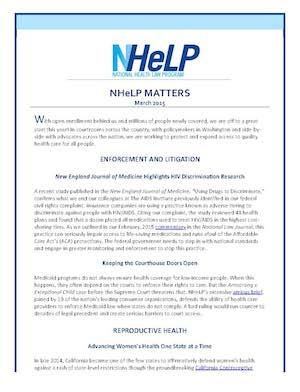With open enrollment behind us and millions of people newly covered, we are off to a great start this year! In courtrooms across the country, with policymakers in Washington and side-by-side with advocates across the nation, we are working to protect and expand access to quality health care for all people.
ENFORCEMENT AND LITIGATION
New England Journal of Medicine Highlights HIV Discrimination Research
A recent study published in the New England Journal of Medicine, “Using Drugs to Discriminate,” confirms what we and our colleagues at The AIDS Institute previously identified in our federal civil rights complaint: insurance companies are using a practice known as adverse tiering to discriminate against people with HIV/AIDS. Citing our complaint, the study reviewed 48 health plans and found that a dozen placed all medications used to treat HIV/AIDS in the highest cost-sharing tiers. As we outlined in our February, 2015 commentary in the National Law Journal, this practice can seriously impair access to life-saving medications and runs afoul of the Affordable Care Act’s (ACA) protections. The federal government needs to step in with national standards and engage in greater monitoring and enforcement to stop this practice.
Keeping the Courthouse Doors Open
Medicaid programs do not always ensure health coverage for low-income people. When this happens, they often depend on the courts to enforce their rights to care. But the Armstrong v. Exceptional Child case before the Supreme Court threatens that. NHeLP’s extensive amicus brief, joined by 19 of the nation’s leading consumer organizations, defends the ability of health care providers to enforce Medicaid law when states do not comply. A bad ruling would run counter to decades of legal precedent and create serious barriers to court access.
REPRODUCTIVE HEALTH
Advancing Women’s Health One State at a Time
In late 2014, California became one of the few states to affirmatively defend women’s health against a rash of state-level restrictions though the groundbreaking California Contraceptive Equity Act. Now, at least five states are following California’s lead to ensure that the ACA’s promise of universal access to contraception without cost-sharing is truly a reality. NHeLP is providing in-depth technical support to state policymakers and advocates to replicate these protections and advance women’s health nationwide.
California AG Heeds Our Call to Protect Women’s Health in Hospital Mergers
In a landmark decision, California Attorney General Kamala Harris answered the concerns of NHeLP and other advocates and imposed strong conditions in a recent hospital merger. Six hospitals owned by the Daughters of Charity, a Catholic health system, are being sold to Prime Healthcare Services, a secular hospital operator. NHeLP provided extensive legal research, testimony and technical support to the Attorney General as she considered the merger. Last month, she approved the merger so long as the hospitals agree to restore and expand reproductive health services that have long been prohibited by the Daughters of Charity, and preserve other important services such as trauma and emergency care, neo-natal intensive care units and robust charity care. The hospitals also cannot impose restrictions on willing providers who want to offer reproductive health services and must have written policies that prohibit discrimination against LGBT individuals. This is a critical win as these hospitals serve primarily low-income and communities of color. The decision means patients will have access to services that had long been denied.
HEALTH REFORM IMPLEMENTATION
Keep Medicaid “Medicaid”
For 50 years, Medicaid has delivered on its commitment to serve as a safety net for the nation’s most vulnerable low-income women, children, older adults and persons with disabilities. With the new Congress, budget hawks will once again put Medicaid on the chopping block. NHeLP’s resources arm policymakers and advocates with the tools they need to defend and keep Medicaid “Medicaid.” NHeLP’s quick brief details why Medicaid is the best way to cover low-income people. Our analysis of the latest ACA replacement plan explains how it would gut Medicaid and worsen uninsurance. And we provide 10 reasons why radically refinancing Medicaid into per capita caps is a bad idea. More than 68.5 million people are counting on us to hold the line.
CALIFORNIA
Court Orders California to Obey the Law
Mr. Rivera was one of hundreds of thousands of Californians caught in the state’s Medicaid backlog and he died waiting for a determination on his eligibility. The Alameda County Superior Court, in a lawsuit by NHeLP and a coalition of legal groups, has ordered that California must determine whether an applicant is eligible for Medi-Cal within 45 days. The order puts an end to the health care limbo that Californians have found themselves in, and is a significant victory. If California cannot determine eligibility within 45 days, then the state must provide provisional benefits to those who are likely to be eligible and notice of a right to a hearing to those still waiting at 45 days.
Making Coverage Count for Children
Medicaid contains robust protections and access to care for children that is directly tailored to identifying and ameliorating conditions facing low-income youth though Early and Periodic Screening, Diagnostic and Treatment (EPSDT) services. Thanks to the advocacy of NHeLP and partners, California issued an important letter specifying that all managed care plans in the state must ensure that children have access to these services pursuant to the federal EPSDT mandate. NHeLP played a pivotal role in reviewing the letter and offering expertise on the needs of children, and legal obligations in serving them, to make sure the state protects its most vulnerable residents.

